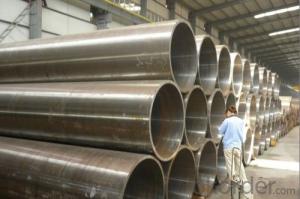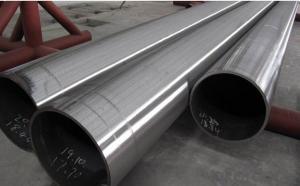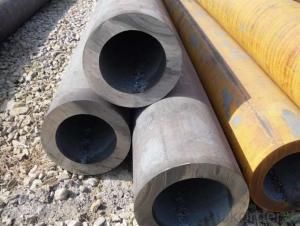Seamless Ferritic Alloy-Steel Pipe for High-Temperature Service in China
- Loading Port:
- Shanghai
- Payment Terms:
- TT OR LC
- Min Order Qty:
- 1000 kg
- Supply Capability:
- 10000 kg/month
OKorder Service Pledge
OKorder Financial Service
You Might Also Like
Product name
ASTM A335 alloy steel pipe
2/ Standard
ASTM SA213, SA335, A369, A209, A250, G3462, G3467, DIN17175, BS3059-2
3/ Material
A213: T2, T5, T9, T11, T12, T22, T91, T92
A335: P1, P2, P5, P9, P11, P12, P21, P22, P91, P92
DIN17175: 15Mo3, 13CrMo44, 10CrMo910, 12CrMo195
BS3059: 360, 440, 460, 620
JIS G3458: STPA12, STPA20, STPA22, STPA23, STPA24, STPA25, STPA26
JIS G3462: STPA12, STBA13, STBA20, STBA22, STBA23, STBA24, STBA25, STBA26
4/ Outside diameter: 141.3mm~720mm
5/ Wall Thickness: 25mm~100mm
6/ Length: 6m-12m, also can be manufactured by customers' requirements
7/ Type: Seamless
8/ Type of ends: Plain ends or bevel ends
9/ Coating for protection: Can be required according to customers' requirement
10/ Application: Widely used in oil, chemical industry, electricity, boiler industry of high-temperature resistance, low temperature resistance, corrosion resistance in pilie lines, etc.
ASTM A335 Seamless Alloy-Steel Pipe
Standard: BS 1139, BS 3059-2, JIS G3454-2007
Grade: 10#-45#, 15NiCuMoNb5, 10Cr9Mo1VNb
Detailed introduction to ASTM A335 seamless alloy steel pipe:
ASTM A335 seamless alloy steel pipe
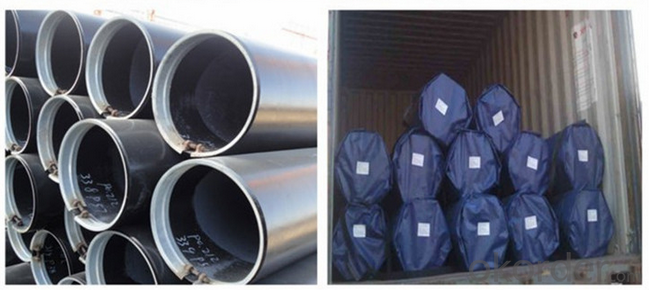
Packaging Detail: | Bundle or Container or as per customers requirement. |
Delivery Detail: | within 25 days after we receive an irrevocable L/Cor 30% deposit |
ASTM A335 Seamless Alloy-Steel Pipe
Standard: BS 1139, BS 3059-2, JIS G3454-2007
Grade: 10#-45#, 15NiCuMoNb5, 10Cr9Mo1VNb
Detailed introduction to ASTM A335 seamless alloy steel pipe:
ASTM A335 seamless alloy steel pipe

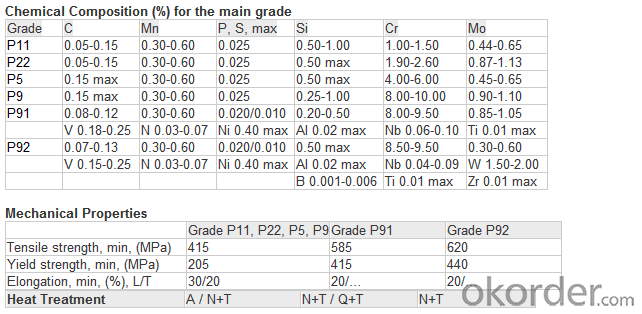
FAQ:
1) why you chose us ?
Professional Manufacturer and supplier of Steel pipe
More than 14 years’ professional producing experience
We can get the lowest ex-factory prices. The price are quite reasonable and it is lower than our commercial peers. also, we can guarantee the qualities of our products.
BV, ISO certificates and SGS test can be provided to assure the quality of our products.
2) Our minimum order quantity:
10 Metric Tons or one 20ft or 40ft Container.
3) How about the Delivery Time?
The steel pipe will be produced since we getting your deposit by T/T or Your original L/C. For normal size, some stocks in our factory now, we can supply once you need.
4)What kind of payment does your company support?
T/T, 100% L/C at sight, Cash, Western Union are all accepted.
5) Do you charge for the samples?
According to our company principle, we just charge for samples, you pay for the freight /courier charge.
6) Main market:
Mid East, South America, Africa, Southeast Asia, India etc
FAQ:
1) why you chose us ?
Professional Manufacturer and supplier of Steel pipe
More than 14 years’ professional producing experience
We can get the lowest ex-factory prices. The price are quite reasonable and it is lower than our commercial peers. also, we can guarantee the qualities of our products.
BV, ISO certificates and SGS test can be provided to assure the quality of our products.
2) Our minimum order quantity:
10 Metric Tons or one 20ft or 40ft Container.
3) How about the Delivery Time?
The steel pipe will be produced since we getting your deposit by T/T or Your original L/C. For normal size, some stocks in our factory now, we can supply once you need.
4)What kind of payment does your company support?
T/T, 100% L/C at sight, Cash, Western Union are all accepted.
5) Do you charge for the samples?
According to our company principle, we just charge for samples, you pay for the freight /courier charge.
6) Main market:
Mid East, South America, Africa, Southeast Asia, India etc
- Q:What are the different types of steel pipe supports for overhead piping?
- Some of the different types of steel pipe supports for overhead piping include clevis hangers, beam clamps, pipe straps, and pipe rollers. Clevis hangers are used to suspend the pipe from a beam or other structural element. Beam clamps attach the pipe to a beam or other support structure. Pipe straps are used to secure the pipe to a wall or other surface. Pipe rollers allow the pipe to move freely while providing support.
- Q:What are the different joining methods for steel pipes?
- The different joining methods for steel pipes include welding, threaded connections, flanges, and grooved connections.
- Q:How do steel pipes handle extreme temperatures?
- Steel pipes are highly durable and can handle extreme temperatures due to their inherent strength and heat resistance. They have a high melting point, allowing them to withstand both very high and very low temperatures without compromising their structural integrity. Additionally, steel pipes have excellent thermal conductivity, which enables them to efficiently transfer heat and prevent damage caused by extreme temperature fluctuations.
- Q:How are steel pipes used in the construction of wind farms?
- Steel pipes are used in the construction of wind farms for various purposes, such as supporting wind turbine towers, providing a strong foundation for the turbines, and transmitting electricity generated by the turbines to the power grid.
- Q:What is the average cost of steel pipes?
- Several factors, including size, grade, and quantity of steel pipes needed, as well as current market conditions, can cause the average cost of steel pipes to vary. Typically, steel pipes range in cost from $500 to $1500 per ton. Nonetheless, it should be emphasized that this is only a rough estimation, and prices may fluctuate due to factors such as demand, location, and quality. For more precise pricing information based on specific project requirements, it is advisable to contact suppliers or manufacturers.
- Q:How are steel pipes used in construction?
- Steel pipes are commonly used in construction for various purposes such as structural supports, plumbing systems, and underground utility installations. They provide strength, durability, and flexibility, making them suitable for carrying fluids, gases, and structural loads. Steel pipes are often used in the construction of buildings, bridges, and infrastructure projects, ensuring reliable and long-lasting performance.
- Q:Where is a steel pipe casing usually used?
- The casing, usually used in the basement construction, to protect the pipeline or convenient pipeline installation hoops.
- Q:How are steel pipes used in oil and gas industry?
- Steel pipes are extensively used in the oil and gas industry for various purposes such as drilling, transporting, and processing oil and gas. They are primarily used as casing pipes, which provide structural support and prevent the collapse of boreholes during drilling operations. Steel pipes are also used for transporting crude oil and natural gas from the wellhead to processing facilities or distribution points. Furthermore, they play a crucial role in the construction of pipelines for long-distance transportation of oil and gas, ensuring efficient and reliable delivery. Additionally, steel pipes are utilized in the construction of oil and gas refineries and petrochemical plants for various processes, including fluid transportation, heat exchange, and storage.
- Q:Can steel pipes be bent?
- Steel pipes can indeed be bent. To achieve this, one usually employs specific tools and methods like pipe bending machines or hydraulic presses. These tools exert pressure on the pipe, leading it to change shape and adopt the desired angle or form. The flexibility of steel pipes makes them adaptable and appropriate for an array of purposes, such as plumbing, construction, and manufacturing. Nonetheless, it's crucial to acknowledge that the extent to which a steel pipe can be bent relies on factors like its diameter, wall thickness, and the type of steel employed.
- Q:What is the difference between hot-dip galvanizing and electroplating for steel pipes?
- Hot-dip galvanizing and electroplating are two common methods used to provide corrosion protection for steel pipes, but there are key differences between the two processes. Hot-dip galvanizing involves immersing the steel pipes into a bath of molten zinc, which forms a metallurgical bond with the steel. This results in a thick and durable zinc coating that provides excellent corrosion resistance. The process of hot-dip galvanizing creates a uniform coating that covers the entire surface of the steel pipe, including both the external and internal surfaces. This makes hot-dip galvanizing particularly effective for protecting both the inside and outside of the pipes. On the other hand, electroplating is a process that involves the deposition of a thin layer of metal onto the surface of the steel pipes using an electric current. In the case of electroplating for steel pipes, typically a layer of zinc is applied. Unlike hot-dip galvanizing, electroplating does not provide a metallurgical bond between the zinc and the steel. Instead, it creates a mechanical bond, which is not as strong or durable as the bond formed through hot-dip galvanizing. The electroplated zinc layer is thinner compared to hot-dip galvanizing, which means it may not provide the same level of corrosion protection. Another difference between hot-dip galvanizing and electroplating is the application process. Hot-dip galvanizing requires immersing the steel pipes into a bath of molten zinc, which can be a time-consuming process. Electroplating, on the other hand, involves applying the zinc coating through an electrolytic cell, which can be faster and more efficient. In summary, the main difference between hot-dip galvanizing and electroplating for steel pipes lies in the thickness and durability of the coating, as well as the bonding mechanism between the zinc and the steel. Hot-dip galvanizing provides a thicker and more durable coating with a metallurgical bond, making it more effective for long-term corrosion protection. Electroplating, on the other hand, creates a thinner coating with a mechanical bond, which may be suitable for applications requiring a less robust level of corrosion resistance.
1. Manufacturer Overview |
|
|---|---|
| Location | |
| Year Established | |
| Annual Output Value | |
| Main Markets | |
| Company Certifications | |
2. Manufacturer Certificates |
|
|---|---|
| a) Certification Name | |
| Range | |
| Reference | |
| Validity Period | |
3. Manufacturer Capability |
|
|---|---|
| a)Trade Capacity | |
| Nearest Port | |
| Export Percentage | |
| No.of Employees in Trade Department | |
| Language Spoken: | |
| b)Factory Information | |
| Factory Size: | |
| No. of Production Lines | |
| Contract Manufacturing | |
| Product Price Range | |
Send your message to us
Seamless Ferritic Alloy-Steel Pipe for High-Temperature Service in China
- Loading Port:
- Shanghai
- Payment Terms:
- TT OR LC
- Min Order Qty:
- 1000 kg
- Supply Capability:
- 10000 kg/month
OKorder Service Pledge
OKorder Financial Service
Similar products
New products
Hot products
Related keywords
